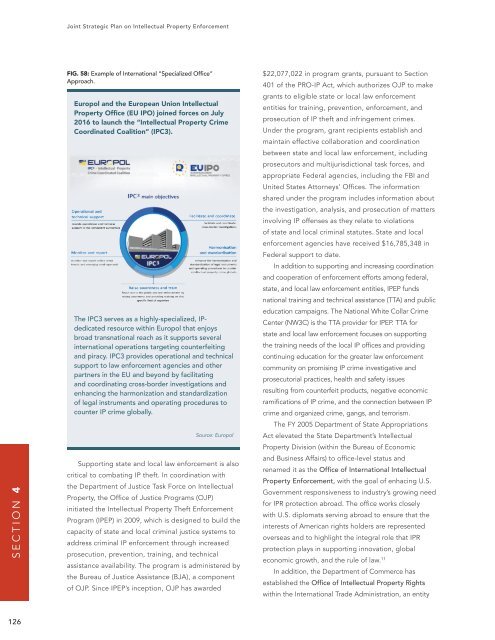ENFORCEMENT
eop_ipec_jointstrategicplan_hi-res
eop_ipec_jointstrategicplan_hi-res
Create successful ePaper yourself
Turn your PDF publications into a flip-book with our unique Google optimized e-Paper software.
Joint Strategic Plan on Intellectual Property Enforcement<br />
SECTION 4<br />
FIG. 58: Example of International “Specialized Office”<br />
Approach.<br />
Europol and the European Union Intellectual<br />
Property Office (EU IPO) joined forces on July<br />
2016 to launch the “Intellectual Property Crime<br />
Coordinated Coalition” (IPC3).<br />
The IPC3 serves as a highly-specialized, IPdedicated<br />
resource within Europol that enjoys<br />
broad transnational reach as it supports several<br />
international operations targeting counterfeiting<br />
and piracy. IPC3 provides operational and technical<br />
support to law enforcement agencies and other<br />
partners in the EU and beyond by facilitating<br />
and coordinating cross-border investigations and<br />
enhancing the harmonization and standardization<br />
of legal instruments and operating procedures to<br />
counter IP crime globally.<br />
Supporting state and local law enforcement is also<br />
critical to combating IP theft. In coordination with<br />
the Department of Justice Task Force on Intellectual<br />
Property, the Office of Justice Programs (OJP)<br />
Source: Europol<br />
initiated the Intellectual Property Theft Enforcement<br />
Program (IPEP) in 2009, which is designed to build the<br />
capacity of state and local criminal justice systems to<br />
address criminal IP enforcement through increased<br />
prosecution, prevention, training, and technical<br />
assistance availability. The program is administered by<br />
the Bureau of Justice Assistance (BJA), a component<br />
of OJP. Since IPEP’s inception, OJP has awarded<br />
$22,077,022 in program grants, pursuant to Section<br />
401 of the PRO-IP Act, which authorizes OJP to make<br />
grants to eligible state or local law enforcement<br />
entities for training, prevention, enforcement, and<br />
prosecution of IP theft and infringement crimes.<br />
Under the program, grant recipients establish and<br />
maintain effective collaboration and coordination<br />
between state and local law enforcement, including<br />
prosecutors and multijurisdictional task forces, and<br />
appropriate Federal agencies, including the FBI and<br />
United States Attorneys’ Offices. The information<br />
shared under the program includes information about<br />
the investigation, analysis, and prosecution of matters<br />
involving IP offenses as they relate to violations<br />
of state and local criminal statutes. State and local<br />
enforcement agencies have received $16,785,348 in<br />
Federal support to date.<br />
In addition to supporting and increasing coordination<br />
and cooperation of enforcement efforts among federal,<br />
state, and local law enforcement entities, IPEP funds<br />
national training and technical assistance (TTA) and public<br />
education campaigns. The National White Collar Crime<br />
Center (NW3C) is the TTA provider for IPEP. TTA for<br />
state and local law enforcement focuses on supporting<br />
the training needs of the local IP offices and providing<br />
continuing education for the greater law enforcement<br />
community on promising IP crime investigative and<br />
prosecutorial practices, health and safety issues<br />
resulting from counterfeit products, negative economic<br />
ramifications of IP crime, and the connection between IP<br />
crime and organized crime, gangs, and terrorism.<br />
The FY 2005 Department of State Appropriations<br />
Act elevated the State Department’s Intellectual<br />
Property Division (within the Bureau of Economic<br />
and Business Affairs) to office-level status and<br />
renamed it as the Office of International Intellectual<br />
Property Enforcement, with the goal of enhacing U.S.<br />
Government responsiveness to industry’s growing need<br />
for IPR protection abroad. The office works closely<br />
with U.S. diplomats serving abroad to ensure that the<br />
interests of American rights holders are represented<br />
overseas and to highlight the integral role that IPR<br />
protection plays in supporting innovation, global<br />
economic growth, and the rule of law. 11<br />
In addition, the Department of Commerce has<br />
established the Office of Intellectual Property Rights<br />
within the International Trade Administration, an entity<br />
126


